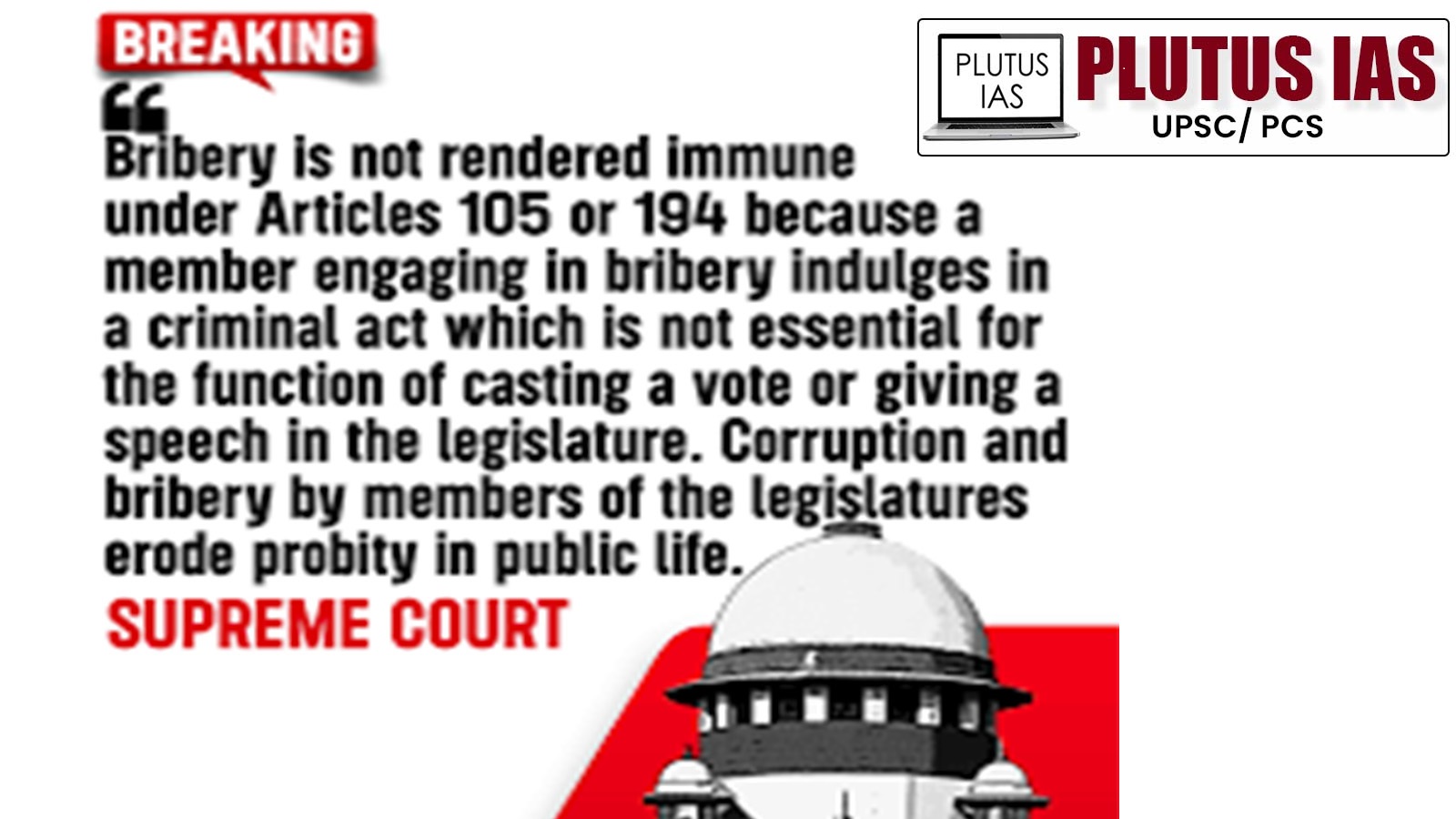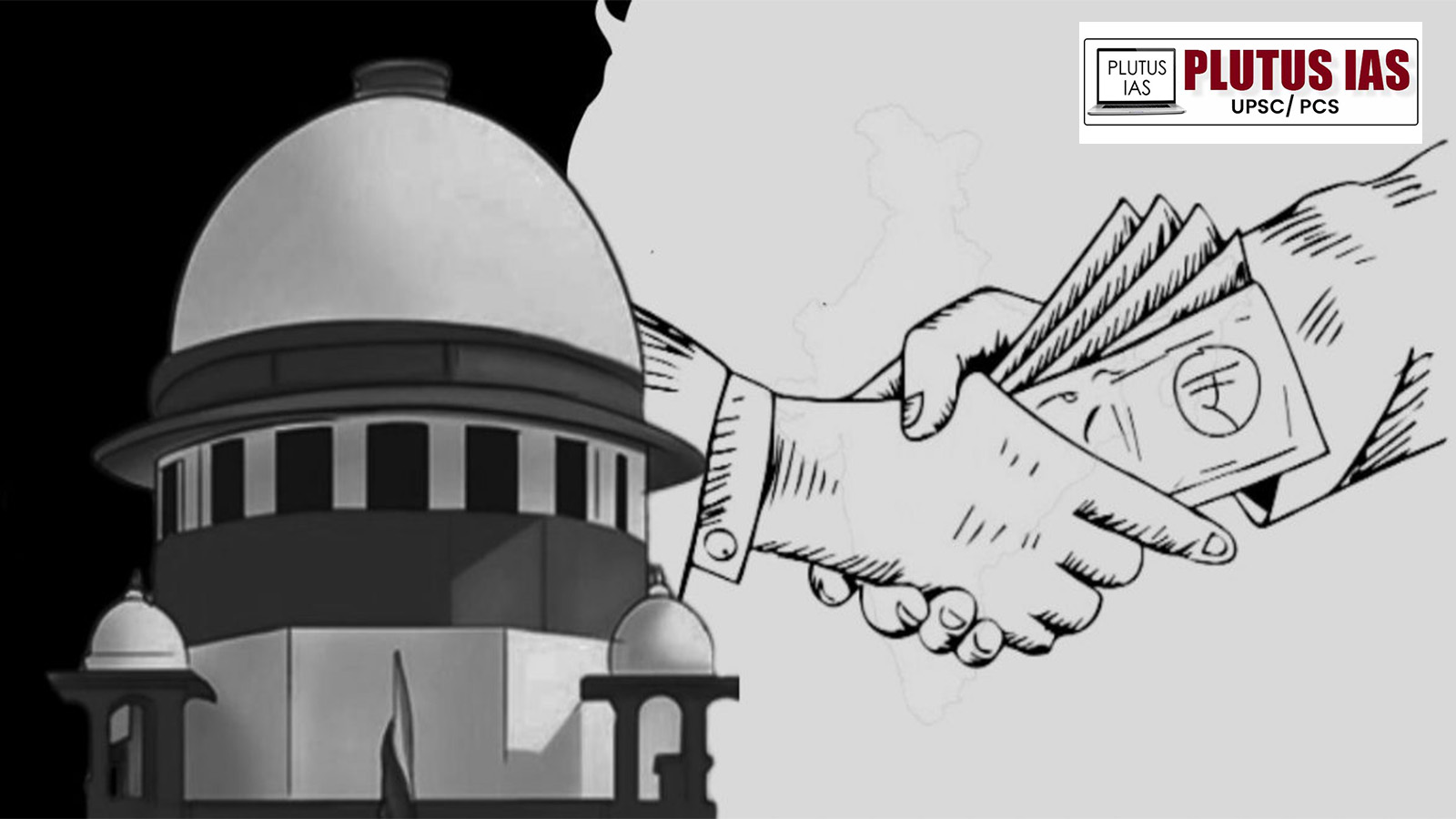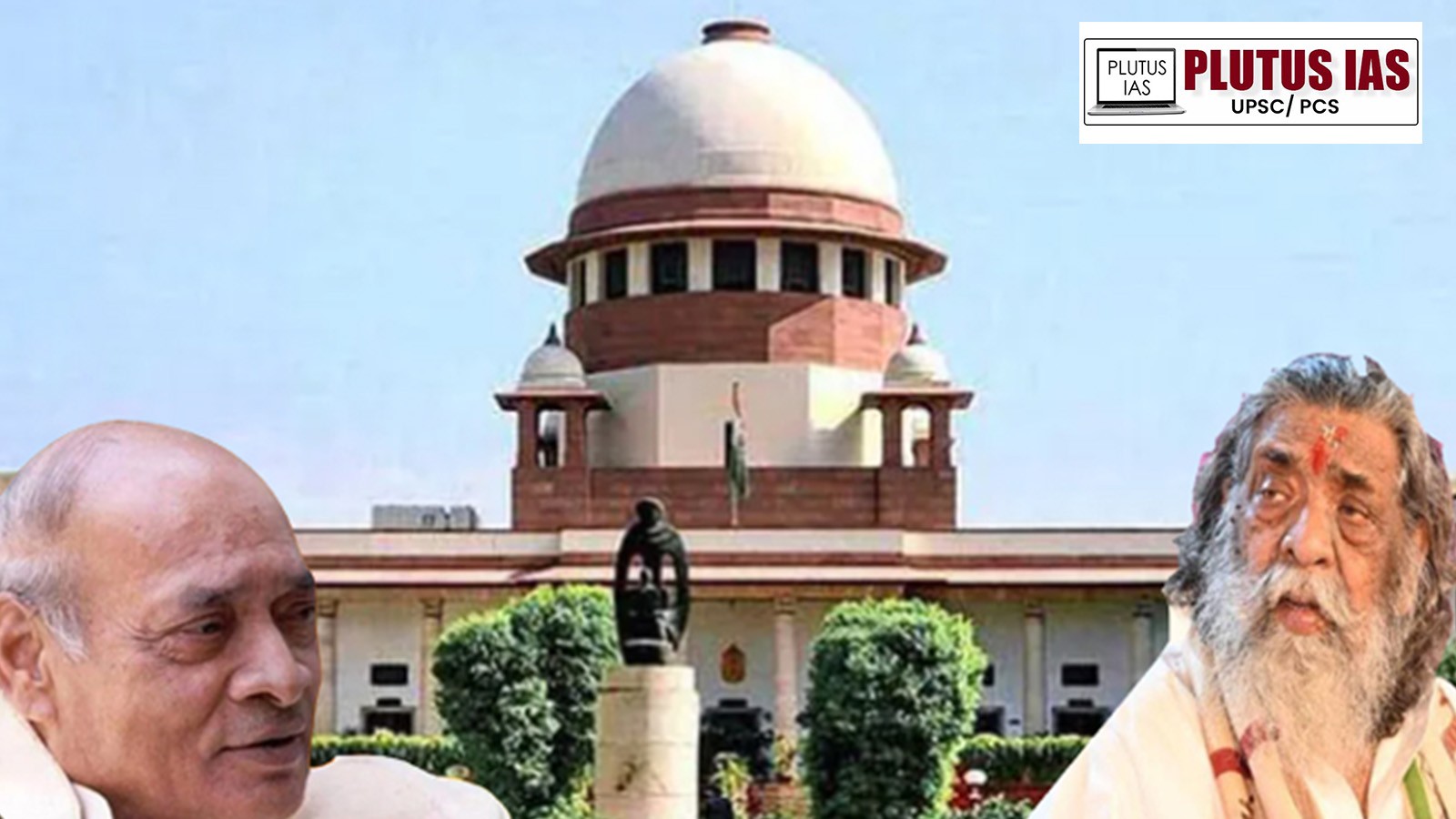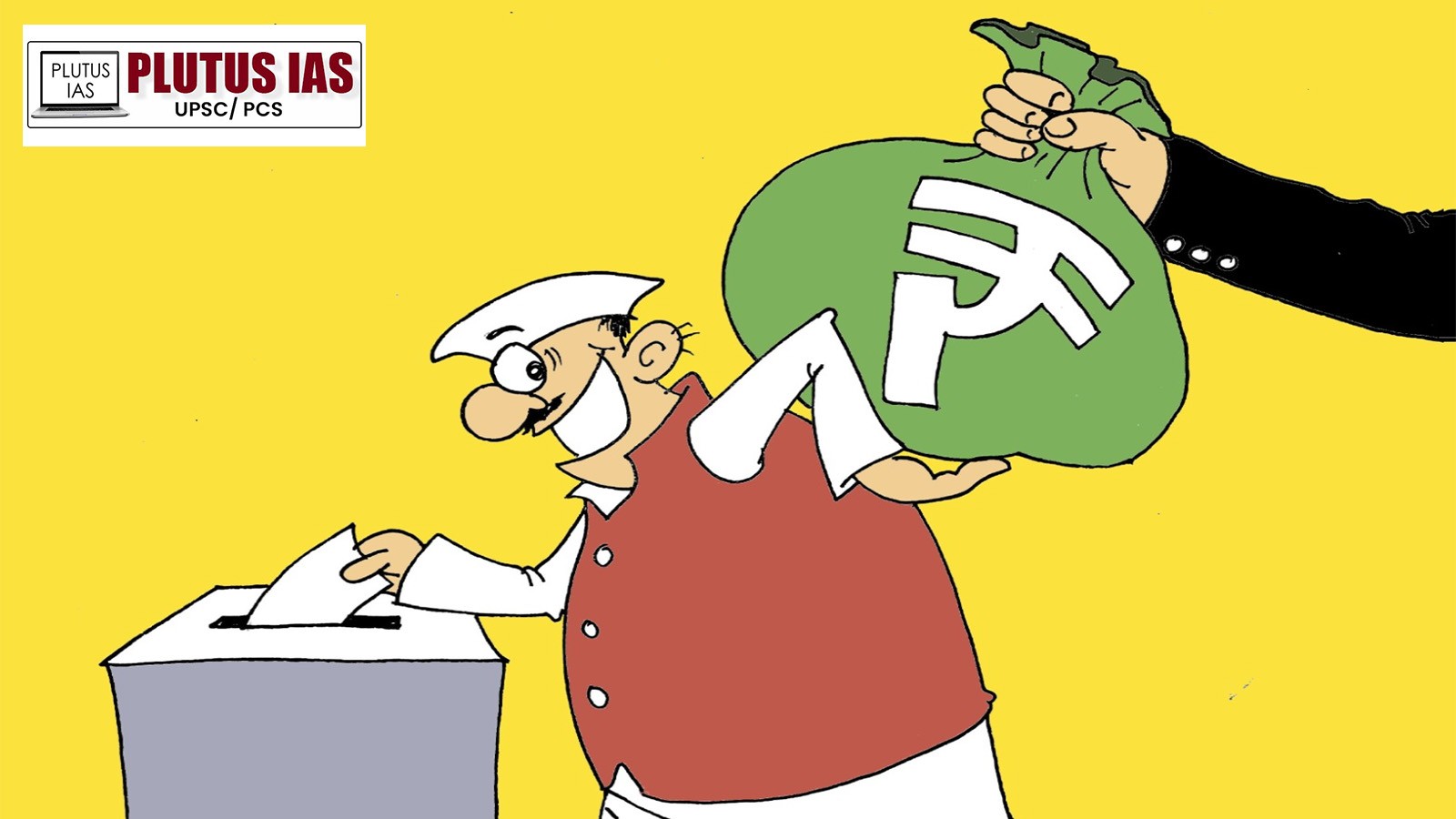06 Mar Bribery is not a Parliamentary Privilege – Supreme Court
Source – The Hindu and PIB.
General Studies – Indian Politics and Governance, Parliamentary Privileges, Representation of the People Law, Offenses under the Representation of the People Act 1951, Supreme Court, Constitutional Bench, Vote for Notes.
Why in the News ?

- Recently, the seven-judge constitutional bench of the Supreme Court of India has given its verdict on February 4, 2024 in the case of taking bribes for speech or vote in the Parliament of India or the Legislature of the States. Taking bribes for speech or vote does not come within the scope of privilege of the House.
- The 7-judge constitutional bench headed by Chief Justice of the Supreme Court of India (CJI) DY Chandrachud comprised the following judges – (1) Justice AS Bopanna (2) Justice MM Sundresh (3) Justice PS Narasimha (4) Justice JB Pardiwala (5) Justice Sanjay Kumar (6) Justice Manoj Mishra.
Present Background of the case :

- Recently, a case was being heard in the Supreme Court of India against Jharkhand MLA Sita Soren, who was an MLA of Jharkhand Mukti Morcha (JMM), on charges of taking an alleged bribe.
- Jharkhand Mukti Morcha (JMM) MLA Sita Soren was accused of casting her vote in favor of an independent candidate in the 2012 elections for the Upper House of India, that is, the Rajya Sabha of India. Had taken a bribe from.
- The decision given by the Supreme Court of India in the year 1998 in the case of former Prime Minister of India PV Narasimha Rao vs. State was made the basis of this case.
- A bench of the then Chief Justice of the Supreme Court of India (CJI) Ranjan Gogoi, Justice Abdul Nazeer and Justice Sanjiv Khanna heard this case in the year 2019.
- Similar to the judgment given in that case by the bench of the then Chief Justice of India (CJI) Ranjan Gogoi, Justice Abdul Nazeer and Justice Sanjiv Khanna in the case of allegations leveled against Jharkhand Mukti Morcha (JMM) MLA Sita Soren. The decision is also exactly like the then decision of the Supreme Court of India. Therefore, the then decision of the Supreme Court of India will be applicable here also and Jharkhand Mukti Morcha (JMM) MLA Sita Soren will also be declared innocent under the provisions of the Representation of the People Act, but the present Chief Justice (CJI) of the Supreme Court of India will A constitutional bench of 7 judges headed by DY Chandrachud overturned the earlier decision given by the High Court of India in this case and said that – “Voting in exchange for currency notes or bribery is not a parliamentary privilege.”
Constitutional provisions regarding Parliamentary Privilege in India :
- Articles of the Indian Constitution according to 105 (2) – If any member of the Parliament in India, no action will be taken against him in any court of India in relation to anything said or vote given by him in the Parliament or any of its committees and also – At the same time, he will not be liable in any court of India for the said act.
- Any member of the Parliament of India or a State Legislature, i.e. an MP or a MLA, within the jurisdiction of the House of the Parliament of India and under the Representation of the People Act, in respect of any publication, report, paper, vote or proceeding in the House, Will not be liable for any kind of action in the court.
- Article 194(2) of the Indian Constitution also provides similar protection to members of any state legislature in India.
Current judgment of the Supreme Court of India :

- A seven-judge Constitution bench headed by Chief Justice of the Supreme Court of India (CJI) DY Chandrachud outrightly rejected the earlier judgment given by the Supreme Court in the Narasimha Rao case.
- The present constitutional bench of 7 judges headed by Chief Justice of the Supreme Court of India (CJI) DY Chandrachud said that – “No single MLA or MP in India can exercise such privilege.”
- The privilege granted to public representatives in India is given to that House collectively in India.
- The decision given by the Supreme Court of India in its own previous judgment which pertains to Narasimha Rao’s case is contradictory to Articles 105(2) and 194(2) of the Constitution.
- Under Article 105 (2) and 194 (2) of the Indian Constitution, the freedom given to public representatives to do and say something inside the Parliament and Legislative Assemblies is related to the collective functioning of the House, and not personal.
- In India, if any public representative takes any kind of bribe, a case is registered against him immediately.
- Therefore, in the case of Jharkhand Mukti Morcha (JMM) MLA Sita Soren, it does not matter whether she asked the question later in the House or whether she gave a speech or not.
- In India, if any MP or MLA gives his speech in the House or casts his vote by taking bribes, then a criminal case can be filed against him in the court in India.
- In India, MPs and MLAs cannot be provided legal protection in cases of taking bribes.
Legal interpretation of the privileges currently provided to public representatives in India :

- On the history of parliamentary privileges in India, the Supreme Court said that while in India this right existed as a separate statute even during the colonial period, after India’s independence this right was transformed into a constitutional privilege.
- The Supreme Court said that parliamentary privileges were introduced in Britain following a conflict between Parliament and the King in the House of Commons.
- supreme court of india According to- Parliamentary privilege has mainly two components;
- A privilege is exercised by the House collectively. This includes -power to punish for contempt of itself, andPower to conduct one’s own affairs, etc.
- The second privilege is for individual rights. This includes -The right of every member to freedom of speech.
- The Supreme Court of India has interpreted the privileges granted to public representatives in accordance with the larger ideals of the Constitution of India.
- The Supreme Court of India said, for this a test will have to be passed.
- According to the government, due to the ‘necessity test’, MPs or MLAs will not be able to discharge their functions.
- This is contrary to their right to freedom of speech.
- A seven-judge constitutional bench headed by Chief Justice of the Supreme Court of India DY Chandrachud said that the Constitution envisages honesty in public life.
- Corruption and bribery of members of the legislature weakens the foundation of Indian parliamentary democracy.
- This is destructive to the aspirational and thoughtful ideals of the Constitution.
- It is moving towards a politics that deprives the citizens of India of a responsible, accountable and representative democracy by the public representatives in India.
- The public representatives of India cannot be justified in taking bribes to discharge their functions as a law maker.
Representation of the People Act, 1951 :
- Representation of the People Act, 1951 Relates to the provisions for the conduct of general elections in India.
- In this act Corruption and other illegal activities related to elections.
- This act contains provisions for redressal of disputes in election related matters.
- This act also contains detailed explanation of the provisions on eligibility as well as disqualification of MPs and MLAs.
Representation of the People Act, 1951 Definition of offense relating to elections as defined in :
- By public representative or candidate Promoting hatred and enmity comes under the category of crime.
- By the public representative or candidate in his/her Violating official duty and providing support to any candidate also falls in this category.
- public representative or candidate Booth capturing, looting or removal of ballot paper or any other type of tampering comes under the category of crime.
- candidate or public representative by Engaging in the sale of liquor two days before the end of voting falls under the category of crime.
- candidate or public representative by Announcing public meetings and creating disturbance 48 hours before voting also falls under the category of crime.
Background of P. V. Narasimha Rao case :

- In India Congress emerged as the largest party in the 1991 Lok Sabha elections.
- PV Narasimha Rao became the Prime Minister. Narasimha Rao’s government faced many challenges; The biggest challenge was the economic crisis. His government carried out historic economic reforms in 1991 and liberalized the economy. At this time, the Ram Janmabhoomi movement was at its peak at the political level. Babri Masjid was demolished on December 6, 1992 in Ayodhya, Uttar Pradesh.
Main reasons for presenting no-confidence motion against P. V. Narasimha Rao government in parliament :
- In the monsoon session of July 26, 1993, Ajoy Mukhopadhyay of CPI(M) moved a no-confidence motion against the Narasimha Rao government.
- In the context of presenting the no-confidence motion by Ajoy Mukhopadhyay, the following reasons were said to be responsible –
- Unemployment and inflation are increasing due to surrender to the IMF and World Bank and bringing anti-people economic policies.
- This is adversely affecting the interests of Indian industry and farmers.
- The Ayodhya incident happened due to the government adopting a compromising attitude towards communal forces.
- The government is failing to save the spirit of secularism mentioned in the Constitution.
- The then government had proved unsuccessful in not punishing those responsible for the demolition of Babri Masjid.
- The then Lok Sabha in India had 528 seats and the Congress had 251 seats. Hence PV Narasimha Rao needed 13 more seats to save the government. Therefore, on July 28, 1993, voting took place in the Parliament on that no-confidence motion, and the government fell by 14 votes in that no-confidence motion. There were 251 votes in favor of that no-confidence motion and 265 votes against it. Three years after this vote, the bribery scandal came to light. Rashtriya Mukti Morcha member Ravindra Kumar filed a complaint with the CBI on February 1, 1996. In this complaint, it was alleged that in July 1993, some Congress leaders had hatched a conspiracy to prove their majority by bribing the MPs of some political parties. CBI had filed a case against some MPs of Jharkhand Mukti Morcha (JMM) in this case.
Judgment of the Supreme Court of India in the case of P. V. Narasimha Rao vs. State :
- Supreme Court of India In the context of CBI investigation, it ruled that:- Jharkhand Mukti Morcha MPs had taken bribes to vote against the no-confidence motion in the Parliament. As a result, due to the voting of him and some other MPs, P.V. Narasimha Rao The government was saved.
- In India In the year 1998, a bench of five judges with a majority of 3-2 had given an important decision in the case of PV Narasimha Rao vs State
- According to this decision –“ Public representatives will be immune from criminal prosecution in case of taking bribes for their speeches and votes in Parliament and Legislature. This is their prerogative. “He cannot be prosecuted for anything done in the House.”
Conclusion / Solution :

- With reference to the present decision The bench of judges of the Supreme Court of India also had to see whether any kind of immunity can be given to an MP or MLA when the MP or MLA takes bribe but votes according to his conscience or his political party. Gives as per the bribe giver’s request.
- The Chief Justice of the Supreme Court of India analyzed Section 7 of the Prevention of Corruption Act, which relates to ‘Offenses related to giving bribes to public servants from.
- In the context of public representatives in India, the Supreme Court of India has ruled that obtaining, accepting or attempting to induce an undue advantage to act or refrain from acting in a certain manner provides sufficient grounds for the offense of commission of public representatives. Does. Therefore, it is not necessary that the work for which bribe is taken or given is actually done.
- The Supreme Court of India held that taking bribes is a crime and it does not depend on whether the public servant would have acted differently or not.
- The Supreme Court also said that –“If extraordinary security is provided to this class then one of the public servants ‘ Illegitimate class’ Making this would be a violation of the right to equality under Article 14 of the Constitution.”
- In India, Parliament has the power to punish its members for contempt. Under which it can suspend the MPs from the House or the MPs can also be sentenced to jail.
- Does the Supreme Court of India have any role in this context or not? This was what the Supreme Court of India had to decide. Therefore, the Supreme Court of India ruled that –
- The Supreme Court and the Parliament of India can both exercise their jurisdiction over the actions of lawmakers in parallel.
- The issue of bribery is not one of exclusive jurisdiction of the House over its bribe-taking members.
- The purpose of the House taking action against a member for contempt for taking bribes serves a different purpose than criminal prosecution.
- This is because the purpose of sentencing by the House is different from the purpose of a criminal trial.
Practice Questions for Preliminary Exam :
Q.1. Consider the following statements regarding parliamentary privilege in India.
- An MP or MLA is not liable to any proceedings in any court in India in respect of any publication, report, paper, vote or proceedings inside the House.
- Parliamentary privilege in India mainly has four components.
- Regarding Section 7 of Prevention of Corruption Act in India ‘Offenses related to giving bribes to public servants from.
- There is nothing wrong in the public representatives of India taking bribes and gifts to discharge their functions as a law maker.
Which of the above statement / statements is/are false?
(A) Only 1 and 3
(B) Only 2 and 4
(C) None of these.
(D) All of these.
Answer – (B)
Practice Questions for Main Exam :
Q.1. Highlighting the main provisions of the Representation of the People Act, 1951, discuss how bribery by public representatives in India is contradictory to India’s democratic character, unity, integrity and public representation privileges? Discuss rationally.




No Comments